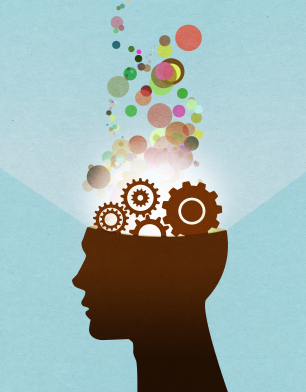
So you’ve been treating your body right, and getting the results you want. But your physical performance is only half the battle, but there’s an entire other universe to be conquered – your brain.
When you upgrade your mind, you allow yourself to focus better so that you can do better quality work even faster, which means you will have more free time to spend on the things you love. You will be able to perform better at all times, even in high-stress situations. You will be able to increase your intelligence, and find solutions to complex problems that leave others baffled.
Step 1: Use the Bulletproof® Diet to Feed Your Bulletproof Mind
Most diets promise to get you thin, but they do this to the detriment of your mental performance. The Bulletproof Diet, on the other hand, was not only designed to give you a lean, healthy body, but also to get you a high-functioning brain. How does this work, exactly?
Eliminating Toxins That Rob Your Performance
The Bulletproof Diet ranks food on a scale from “Bulletproof” to “Toxic.” And it’s essential for healthy brain function to avoid the performance-robbing toxins found in many crops including grains, vegetables, and even coffee. These toxins are produced by the plants themselves (like the natural pesticides found on spinach and kale) or are released by mold growing on the plant, which is a known problem in the agricultural industry. These toxins give you brain fog that places a huge burden on your brain’s ability to perform at the level you want it to.
Stop Depending on Sugar for Fuel and Jumpstart Ketosis
When you follow the Bulletproof Diet, you eat a restricted amount of carbohydrates, which puts you into ketosis. This means that your liver converts the fats you eat into an energy source, ketones, so that you no longer need carbohydrates to function. This is great for your brain, because your brain prefers ketones to perform certain jobs. In fact, even if your liver isn’t producing ketones, your brain will make some on its own to maintain the health of synapses. Ketones are a more efficient source of energy for your brain than sugars are, and if your brain is working more efficiently, so is everything you do.
Drinking Bulletproof® Coffee in the Morning
The Bulletproof Diet isn’t just your typical low-carb diet that helps you move slowly towards ketosis. A staple of the diet, Bulletproof® Coffee, can kick you into ketosis much faster than you could get there on your own. The medium-chain fatty acids in Upgraded XCT Oil and Brain Octane Oil can also aid in your ketone production. On top of that, you’ve got the added stimulant benefits of the caffeine and diterpines in coffee.
Going Gluten-Free
Unless you’ve been living under a rock, you’ve probably heard about the negative health effects of gluten. Gluten can cause learning problems, focus issues, and memory malfunction. Gluten causes your body to elevate levels of inflammation, particularly by forming cytokines, proteins that are found in patients with Alzheimer’s, Parkinson’s, multiple sclerosis, and autism — all neurological diseases.
Limiting Histamine
The Bulletproof Diet is comprised of foods with low histamine levels, which have more of an impact on you than just causing your seasonal allergy issues. Histamines are a neurotransmitter, which means they send messages between your body and your brain. High histamine levels can cause headaches, sleep issues, and anxiety, and you can get histamines not just from your allergies, but also through food — particularly aged, smoked, or cured foods. Since the Bulletproof Diet advocates fresh meat, eggs, and produce — all low-histamine foods — it can help protect you from these problems.
Eating More Healthy Fats
Your brain is mostly made up of saturated fats and cholesterol, which is why people supplement with DHA and EPA (both fatty acids) to support brain health with supplements like Krill Oil. Your mind uses fat to recover and repair itself, resulting in improved memory, increased cognitive skills, and better moods. Bulletproof’s high-fat diet (up to 70% of daily calories) supports a Bulletproof body and a Bulletproof mind.
Step 2: Restore Your Memory with Sleep
How Sleep Helps the Brain Function
You know how groggy you feel the next day when you barely get any sleep during the night? It’s not just because you want sleep; it’s because your brain needs quality sleep to function properly. When you sleep, it gives your brain a chance to repair the neurons that you exhaust during the day while you’re active. It also gives your brain time to exercise the connections between your neurons. In fact, a recurrent lack of sleep may actually cause loss of brain cells – the last thing you want when you’re trying to be Bulletproof.
Good Sun Exposure and a Healthy Circadian Rhythm
Did you know that people whose offices have windows get better sleep than those who work in windowless workspaces? That’s because getting enough sun exposure everyday keeps your body’s clock – or circadian rhythm – on point. Sunlight tells your body to postpone making melatonin – the hormone that makes you tired and helps you sleep. So it’s a great idea to get some sun in the morning if you can, but if you’re rushing to get to work and don’t have time to take a leisurely walk, you can take your vitamin D supplements in the morning instead. Since sunlight makes your body produce vitamin D, which put offs melatonin production, taking a morning dose of the vitamin may make your body feel like you’ve been outside. (For this reason, you want to avoid taking your vitamin D at night, which can interfere with sleep).
How to Hack Your Sleep
Eight hours of quality sleep can increase your ability to tackle complex problems by 50%. So how do you get that kind of sleep? First, invest in Sleep Cycle, a simple iPhone app that tracks the quality of your sleep, just by placing your phone on your bed!
After you’ve done that, install F.lux on your computer, which changes the light from your computer screen to adjust for the time of day, helping your brain prepare for sleep even when you use your computer at night (that said, you want to avoid bright lights like the TV for an hour before bed). You should also avoid exercising for at least two hours before bed.
Step 3: Smart Drugs and Nootropics
Nootropics, or “smart drugs,” are some of my favorite hacks. These substances increase your brain’s performance – you remember more, learn better, concentrate more fully, and can even increase your intelligence. These drugs are also neuroprotective, so they protect your brain from injury (unlike amphetamine-derived stimulants like adderall).
Vitamins and Nutrients
But if smart drugs aren’t your thing, you can always boost your mental performance with nutrients, such as Magnesium, vitamin D, Krill Oil, Turmeric, and vitamin B.
- Magnesium can actually reverse the affects of stress on your brain, and can therefore increase your memory and cognitive function. Magnesium is also vital to ATP production, so low magnesium means low brain energy, which isn’t Bulletproof!
- Vitamin D is also a great supplement for your brain. It helps protect you from free radical damage, which can decrease your cognitive performance.
- Krill oil, which is packed with DHA, EPA and Astaxanthin, keeps the neurons in your brain communicating freely. Better communication in your nervous system obviously means that you’re going to be smarter, faster, and better.
- Turmeric is a spice used frequently in Indian food. It contains curcumin, which is great for your brain. Curcumin is an antioxidant that travels easily from your blood to your brain, and like vitamin D, it helps protect your brain from free radical damage.
- B Vitamins fight off the amino acid homocysteine, which increases brain shrinkage and may lead to Alzheimer’s. In fact, it seems that vitamin B may be able to decrease brain shrinkage by up to 90%, and may make shrinkage 7 times slower. And we all know that size matters.
Other Natural Supplements
- CILTEP® – CILTEP®, short for “Chemically Induced Long-Term Potentiation,” is an all-natural supplement created by Abelard Lindsay that can improve your mental performance. It helps you be more focused, motivated, and retentive. CILTEP® works by optimizing levels of intracellular second messengers, which carry signals between your brain cells.
- Choline – Choline is an essential micronutrient that helps your brain make the neurotransmitter acetylcholine, which fosters intelligence and memory. There are also some studies that suggest it may be protective against Alzheimer’s and other forms of dementia. You can find choline in supplements like Choline Force.
- Upgraded™ Glutathione Force – Glutathione is the best antioxidant out there. Your liver already makes its own supply, but with today’s constant environmental exposure to toxins, it’s good to help out your liver. Supplementing Glutathione through a lipsomal form like Glutathione Force (other forms are destroyed by your gut before being absorbed) is a great idea because your brain makes more free radicals than any other organ in your body, and these free radicals accelerate cell death. Glutathione helps eliminate these free radicals and protects your brain from them, so it optimizes your brain function.
- Upgraded™ Aging Formula – The foundation of Upgraded Aging Formula is oxaloacetate, or OAA. This supplement works to protect the neurons in your brain from toxins, and there is also evidence that it can improve your short term memory and help you think more clearly and efficiently.
Modafinil
Modafinil, commonly known as provigil, is by far going to pack the most powerful punch. It helps you focus on what you’re doing so that you can do things not only more efficiently, but better. Modafinil is also much safer than drugs like Adderall and other stimulants because it doesn’t give you the same sensation of heart-racing, jittery speediness. It doesn’t flood your brain with dopamine and instead of forcing your body to stay awake, modafinil boosts your focus so that you’re actually more alert.
Step 4: Hacking Your Nervous System
Meditation and Breathing to Calm Your Mind
When you suffer from stress (as most people do), it’s too hard to focus and be productive and too easy to have recurring irrational thoughts. It can also cause poor judgment and memory problems, and that’s certainly not Bulletproof. A good way to combat stress is to use meditation and breathing exercises.
When you meditate, you practice the art of mindfulness, which allows you to choose which thoughts you want to focus on. It allows you to choose how you respond to your feelings instead of blinding reacting to them. Different ways of meditating include counting, mantras, mindfulness, positive self-talk, and controlled breathing exercises.
With controlled breathing, you want to breathe from your diaphragm, not your chest. Pull the air in through your nose all the way down into your belly, then exhale with your stomach first, using your diaphragm to push the air out of your lungs. Only your stomach should move, not your chest. The inhale should be a long, continuous breath, followed by a pause before exhaling, and then another pause before taking the next breath. This slow, steady breathing can help control your heart rate and allow your mind to relax.
Heart Rate Variability Training
When you are relaxed, you have a rhythmic heart rate variability, or the amount of time between each beat. Under stress, your body resorts to a fixed, inflexible rhythm. HeartMath technologies (like the emWave2 or the Inner Balance™ Sensor) use a tiny sensor to calculate your heart rate variability, and warns you that you are showing signs of stress (perhaps before you even realize it). The sensor guides you to take deep breaths every five seconds as you listen to music or meditate to resume relaxed heart rate variability. By warning you that you are getting stressed, and teaching you to prevent stress before it starts, you can stay more focused, controlled, and in better moods.
Gratitude and Forgiveness
Taking a few minutes a day to do a gratitude and forgiveness exercise can be unbelievably beneficial. In fact, it’s probably the most powerful biohack ever. Either stop everything you’re doing and consider what you are grateful for, or write your thoughts about gratitude and forgiveness down in a journal (like The 5-Minute Journal). By doing this, you can increase your happiness, recover more easily from stress (I mean, how much stress do you carry around from your anger and hurt?), and become more effective at work. In fact, gratitude exercises are shown to increase decision making abilities and encourage productivity. It also makes you generally more likeable.
Step 5: Neurofeedback
Neurofeedback is when you re-teach your brain how to respond to different emotions. Cool, right? You have EEG sensors placed all over your scalp, and monitor your brainwaves in different areas. Then you play a “video game” with your brain, using your brain electricity to make the game progress. The more positive brain activity, the faster the game goes (positive reinforcement), and the more undesirable brain activity, the slower the game goes. Eventually, this cycle of positive and negative reinforcement re-teaches the brain which brain waves are desirable, so that they can replace your previous negative responses to stressors.
To get neurofeedback, you can either buy your own Neuroptimal unit, or you can find a local practitioner.
40 Years of Zen
40 Years of Zen is an intensive 7-day neurofeedback program that puts you in the same mindstate as advanced (we’re talking to 20 to 40 years) zen practitioners. It takes 7 very long, very full days of monitoring and retraining your brain at a facility dedicated solely to this process, but it can increase your IQ by an average of 12 points, and increase creativity by an average of 50%, and it’s hands-down the fastest, most efficient way to reap the benefits of neurofeedback.
Step 6: Other Fun Hacks For The Bulletproof Mind
Inversion Therapy (Hanging Upside Down)
It sounds weird, but hanging upside down is a great way to hack your brain. Regular inverting trains your brain capillaries, making them stronger and more capable of bringing oxygen to your brain. It’s pretty straightforward — more oxygen to your brain means better brain performance. As an added bonus, after repeated inverting, the way your body regulates blood pressure actually changes.
Using Light to Get a Mitochondrial Boost
You can use light to affect your mitochondrial function. Just hold a red LED light to the place where you want a boost – your stomach, a sore muscle, or up your nose if you want to bump up your brain — for a few minutes, and you will experience more mitochondrial activity, meaning more cellular energy and better cellular communication.









